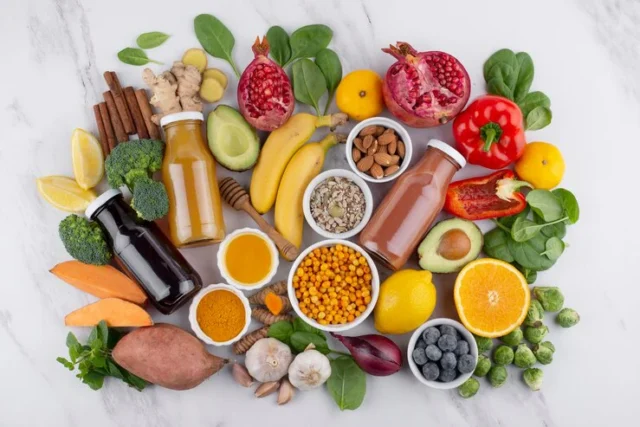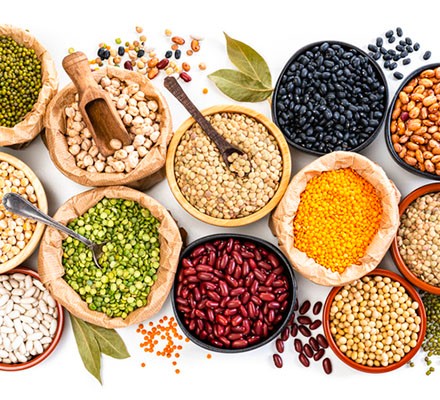Ever wondered why high-protein diets are all the rage when it comes to weight loss and fitness? The secret lies in how protein interacts with your metabolism. Protein does more than just repair muscles or build tissues—it’s a metabolic powerhouse that can help you burn calories more efficiently.
Let’s dive deep into the science of metabolism and explore how protein plays a starring role in boosting your calorie-burning potential.
Table of Contents
Understanding Metabolism and Its Role in Energy Regulation

What Is Metabolism?
Metabolism is the process by which your body converts food and drink into energy. This complex system involves thousands of chemical reactions that keep you alive, from breathing and circulating blood to repairing cells and powering physical activities.
Your metabolism can be divided into three key components:
- Basal Metabolic Rate (BMR): The energy your body uses at rest to maintain basic functions.
- Activity Energy Expenditure: Calories burned during physical activities.
- Thermogenesis: Heat production in the body, including the energy used to digest food.
The Relationship Between Metabolism and Calories
Calories are the units of energy your body needs to fuel these processes. When your metabolism is efficient, your body uses calories effectively, helping maintain or even reduce weight. However, several factors—age, genetics, muscle mass, and activity level—can influence your metabolic rate.
The Science Behind Protein and Its Role in the Body

What Is Protein?
Protein is one of the three macronutrients, alongside carbohydrates and fats. Composed of amino acids, it’s essential for various bodily functions, including tissue repair, enzyme production, and immune system support.
Dietary sources of protein include:
- Animal-based proteins: Chicken, fish, eggs, and dairy.
- Plant-based proteins: Lentils, beans, quinoa, and nuts.
Protein’s Essential Functions
Protein serves multiple purposes, making it vital for overall health:
- Muscle Repair and Growth: Essential for athletes and active individuals.
- Enzymes and Hormones: Protein is a building block for enzymes that regulate metabolic reactions and hormones like insulin.
Protein’s Effect on Metabolism

Thermic Effect of Food (TEF)
One of protein’s standout metabolic benefits is its high Thermic Effect of Food (TEF)—the energy your body uses to digest and process food. Protein’s TEF is about 20-30%, significantly higher than carbohydrates (5-10%) and fats (0-3%). This means your body burns more calories just breaking down protein.
Muscle Mass and Resting Metabolism
Protein supports muscle growth, which is crucial for boosting resting energy expenditure (REE). Muscle tissue burns more calories than fat tissue, even at rest. By eating adequate protein and engaging in resistance training, you can increase your REE and burn more calories around the clock.
Protein and Weight Management
Appetite Regulation
Protein can be your best ally in controlling hunger. It impacts hormones like ghrelin (the hunger hormone) and leptin (the satiety hormone), helping you feel full longer. This means fewer cravings and less snacking throughout the day.
Fat Loss vs. Muscle Preservation
When trying to lose weight, it’s easy to shed muscle along with fat. High-protein diets minimize this risk, helping preserve lean muscle while promoting fat loss. This is especially important during calorie deficits, ensuring your body focuses on burning fat stores for energy.
How to Incorporate Protein Into Your Diet for Optimal Metabolism

Including sufficient protein in your diet doesn’t have to be complicated. By understanding your specific needs and making informed choices about protein sources, timing, and distribution, you can maximize the benefits for your metabolism and overall health.
Recommended Protein Intake
The amount of protein you need depends on factors such as age, gender, activity level, and specific health goals.
- General Recommendations:
- The Recommended Dietary Allowance (RDA) for protein is 0.8 grams per kilogram of body weight for the average adult.
- For an adult weighing 70 kilograms (about 154 pounds), this equates to 56 grams of protein per day.
- For Active Individuals and Athletes:
- Higher protein intake is necessary for muscle repair and recovery. Experts recommend 1.2 to 2.0 grams per kilogram of body weight depending on activity intensity and type.
- Special Considerations for Older Adults:
- Older adults are at greater risk of muscle loss. A daily intake of 1.2 to 1.5 grams per kilogram is advised to preserve muscle mass and maintain strength.
Best Sources of Protein
Choosing a variety of protein-rich foods ensures you get all essential amino acids and other nutrients.
- Animal-Based Proteins:
- These are considered complete proteins as they contain all essential amino acids.
- Examples: Chicken, turkey, eggs, fish (like salmon or tuna), dairy products (yogurt, milk, cheese), and lean red meat.
- Plant-Based Proteins:
- These may lack one or more essential amino acids but can be combined for complete protein profiles.
- Examples: Lentils, chickpeas, tofu, tempeh, quinoa, edamame, and nuts.
- High-Protein Meal Ideas:
- Breakfast: Greek yogurt with chia seeds and berries.
- Lunch: Grilled chicken salad with a quinoa base.
- Dinner: Baked salmon with steamed vegetables and wild rice.
- Snack: Hard-boiled eggs or a handful of almonds.
Timing and Distribution of Protein Intake
The way you distribute protein across meals is just as important as the total amount.
- Spread It Out:
- Aim to consume protein consistently throughout the day rather than loading up at one meal.
- Example: 20–30 grams of protein at each meal for a total daily intake of 90 grams.
- Post-Workout Recovery:
- Consuming protein after exercise enhances muscle repair and growth. Pair it with carbohydrates for optimal glycogen replenishment.
- Examples: A protein shake with banana or a turkey sandwich.
Potential Risks of Excessive Protein Consumption

While protein is essential, consuming it in excess can raise concerns, particularly when not balanced with other macronutrients.
Is Too Much Protein Harmful?
- Protein and Kidney Health:
- A common myth is that high-protein diets harm the kidneys. However, studies show this risk primarily applies to individuals with preexisting kidney conditions.
- For healthy individuals, protein intake up to 2.0 grams per kilogram of body weight is generally considered safe.
- Dehydration Risks:
- High protein intake can increase water loss due to higher nitrogen excretion. Staying hydrated is crucial.
- Safe Upper Limits:
- The maximum tolerable limit for most people is about 3.5 grams per kilogram per day. Exceeding this can lead to gastrointestinal discomfort or nutrient imbalances.
Balancing Macronutrients
- Importance of a Balanced Diet:
- Overemphasis on protein may result in neglecting other macronutrients like carbohydrates and fats, which are equally important for energy and cellular functions.
- Risks of Neglecting Carbs and Fats:
- Carbs are crucial for quick energy, especially during high-intensity exercise.
- Healthy fats support hormone production and brain function. A diet low in these can lead to fatigue and mood swings.
Additional Tips to Boost Metabolism Naturally
Combining protein with other lifestyle strategies can further amplify its metabolic benefits.
Pairing Protein with Exercise
- Strength Training:
- Resistance training, such as weightlifting, pairs perfectly with protein intake. This combination stimulates muscle growth and increases resting energy expenditure.
- High-Intensity Workouts:
- Interval training or circuit workouts provide a significant metabolic boost, burning calories long after the session ends.
Lifestyle Factors That Support Metabolism
- Get Enough Sleep:
- Sleep deprivation negatively impacts metabolic health and hunger hormones, leading to overeating.
- Stay Hydrated:
- Dehydration can slow down metabolism. Aim for at least 8–10 glasses of water daily.
- Manage Stress:
- Chronic stress elevates cortisol levels, which can disrupt metabolism and promote fat storage.
Conclusion: The Power of Protein in Boosting Metabolism
Protein is a game-changer when it comes to metabolism and calorie burning. By understanding its role and incorporating it into your daily routine strategically, you can enjoy benefits like increased muscle mass, better appetite control, and enhanced calorie burning. Pair this with exercise and healthy lifestyle choices for a holistic approach to optimizing metabolism.
Frequently Asked Questions
1. What is the thermic effect of food, and why is protein significant?
The thermic effect of food (TEF) refers to the energy your body uses to digest, absorb, and metabolize nutrients. Protein has the highest TEF, requiring 20–30% of its calorie content for digestion, making it a key factor in boosting metabolism.
2. Can eating too much protein damage your kidneys?
For healthy individuals, high-protein diets do not harm the kidneys. However, those with preexisting kidney conditions should monitor their protein intake carefully and consult a doctor.
3. What are some easy ways to add more protein to my diet?
Incorporate eggs, Greek yogurt, nuts, lean meats, tofu, and legumes into your meals. Snacks like string cheese or protein bars are also convenient options4. How does protein compare to carbs and fats in boosting metabolism?
Protein has the highest thermic effect, burning more calories during digestion than carbohydrates and fats. It also supports muscle growth, which enhances resting metabolic rate.
5. Can protein help with long-term weight loss?
Yes, protein promotes satiety, reduces calorie intake, and helps preserve muscle mass during weight loss, making it an effective tool for sustained weight management.



MOST COMMENTED
Animal-Based Proteins / Casein Protein / Dietary Protein / High-Protein Diets / Pea Protein / Plant-Based Proteins / Protein / Protein Deficiency / Protein Supplements / Proteins / Whey Protein / Whey Proteins
Pea Proteins: The Best Plant-Based Protein Alternative?
Foot Problem / Foot Health
Revolutionize Your Recovery: Natural Remedies for Plantar Fasciitis – Fresh Home Keepers
Dietary Supplement
Revitalize Your Health: The Magic of Red Yeast Rice Capsules
Exercises and Footwear Tips for Hammertoe Relief / Foot care / Foot Health / Foot Pain / Foot Problem / Hammertoes
Unlock Effective Exercises and Footwear Tips for Hammertoe Relief
Hammertoes / Foot Health / Foot Pain / Foot Problem
Unlock Relief: Essential Guide to Hammertoes Causes, Symptoms, and Treatments
Moringa Powder / Moringa Supplement
Green Superfood: The Ultimate Guide to Moringa Leaf Powder
Moringa Powder
Supercharge Your Diet: The Incredible Impact of Moringa Leaf Powder
Animal-Based Proteins / Casein Protein / Dietary Protein / High-Protein Diets / Pea Protein / Plant-Based Proteins / Protein / Protein Deficiency / Protein Supplements / Proteins / Whey Protein / Whey Proteins
Is Protein Powder Safe for Teenagers and Children?
Animal-Based Proteins / Casein Protein / Dietary Protein / High-Protein Diets / Pea Protein / Plant-Based Proteins / Protein / Protein Deficiency / Protein Supplements / Proteins / Whey Protein / Whey Proteins
Unlock the Power of Proteins for Optimal Gut Health
Shin Splints / Foot Health / Foot Problem
Unlock Relief: Essential Guide to Overcoming Shin Splints – Discover Healing Strategies